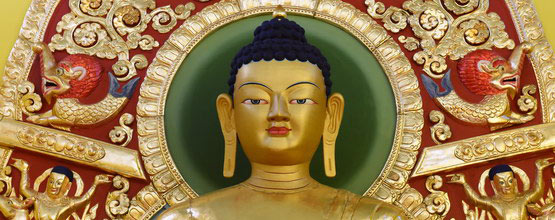"Do not commit any unwholesome actions,
Accumulate virtuous deeds,
Tame your own mind -
These are the Teachings of Buddha".
Buddhist practice consists of the right conduct, taming the mind and deeper understanding, which are in short known as morality, meditation and wisdom. The right conduct consists of generosity, ethical self-discipline and patience. Mastering the mind can be achieved through practicing calm-abiding meditation, through which we learn not to be under the blinding influence of destructive states of mind, such as anger, jealousy, pride, lust, dullness and distraction. Deeper understanding arises from studying the Teachings, reflecting upon them and from experience, which comes from applying the Teachings.
One's negative tendencies, defilements and obscurations gradually disappear through joyful efforts in all aspects of practice. This allows the natural, innate qualities, called the Buddha nature, to manifest and Awakening is reached.
The first step on the Buddhist path is taking Refuge in the Buddha, Dharma and Sangha during a ceremony led by a Lama representing a Dharma Lineage. Additionally, one can take the lay ethical vows. At this stage, the emphasis is on learning the Teachings in order to develop the right view without which it is not possible to achieve the fruits of meditation. Along with the deepening understanding, the student may ask the Lama for the Bodhisattva vows and thus enter the path on which one devotes him or herself for the benefit of all beings.
Anyone can practice the Dharma, regardless of their age, gender, social status, education or capacities. There are teachings suitable for those, who primarily value direct work for the sake others. There are also teachings, which engage intellect and through logical analysis lead to the development of the individual. There are also teachings appropriate for those who want to devote themselves to contemplation and meditation. There are also methods, which allow taking onto one's spiritual path the hours spent at work, taking care of one's family and participating in social life.
In the Kagyu tradition, we also apply particularly effective methods of working with the body, speech and mind, known as the Vajrayana path. As these methods are very profound, they require personal transmission from the Lama and his or her constant guidance. There are practices, which applied incorrectly may be very dangerous. That is why they are considered secret practices; they require a number of intensive preparations and some are practiced only in strict retreat. However, they allow making a profound spiritual change and developing the positive spiritual potential hidden in human nature in a relatively short period. Thus, one can more fully apply the Bodhisattva's path, which is work for the benefit of all beings.
The majority of practitioners do not need to engage in these time-consuming meditation exercises. Thanks to the Buddha's teachings, one may bring deep meaning to one's everyday life, infuse it with spiritual qualities and make sure that with a sense of well-used life, without regret and fear, one is ready to meet what awaits one in the moment of death.
Lama Rinchen


